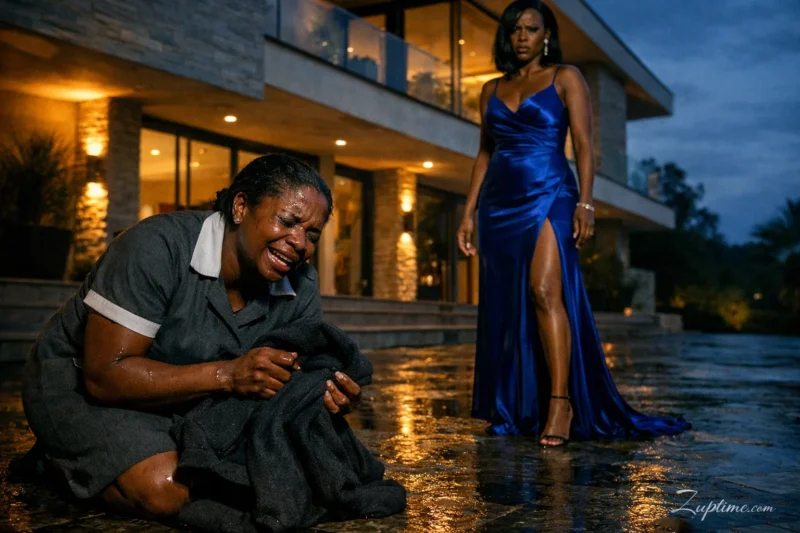My son’s wife relocated across continents for him. She nurtured their twin daughters with devotion, proving herself an exceptional daughter-in-law. Then, abruptly, he ended their marriage and swiftly announced a new engagement. Anger surged within me, so on his wedding day, I chose to bring a gift—not intended for him.
Let me retrace the story a little.
My son, Nishan, encountered Leyla during his studies in Istanbul. One evening, he phoned me, his voice buoyant, saying he’d met someone extraordinary. When I first met her, Leyla enveloped me in a warm embrace, as if I were already part of her world. Her kindness shone through in small, thoughtful gestures. She crafted orange peels into flower shapes for the twins and brewed tea to my exact preference without needing to ask. For seven years, she was the steady heartbeat of their family.
Then, without warning, he informed me of their divorce.
At first, I thought he was jesting. Leyla had sent me photos of the girls in their recital costumes only days earlier, her face weary but radiant. Yet Nishan’s tone was detached, almost mechanical. “It’s mutual, Amma,” he claimed, as if it were a simple contract. But it wasn’t mutual. Leyla learned of his infidelity three days after the papers were finalized.
Fury consumed me. I tried to reason with him, to comprehend his choices. But he deflected, repeating, “It’s my decision. You’ll see my perspective someday.”
I didn’t. I still don’t.
The new woman, Arissa, was strikingly young. Attractive, certainly. Driven. She worked in real estate and shared inspirational quotes online. Yet she had no ties to our family, no warmth for the girls. The first time we met, she barely glanced up from her phone as the twins bounded into the room. Leyla, by contrast, would kneel to their level, arms wide, as if they were her entire universe.
The wedding arrived swiftly, a mere three months after the divorce.
The invitation felt like a sting. Elegant white cardstock, adorned with gold calligraphy, read, “We invite you to celebrate our new chapter.”
Our?
I lingered on that word for hours.
Leyla never urged me to skip the event. She never spoke ill of him, not even once. Her only request was soft-spoken: “Please don’t choose sides. It would unsettle the girls.”
But in my heart, I had already chosen her.
On the wedding morning, I wore the maroon sari Leyla gave me for my birthday two years prior. She’d said its hue matched my “spirit.” I tucked two items into my purse: a small envelope and a locket from my youth.
The venue was as I anticipated—lavish, impersonal, costly. Orchids sat in crystal vases, and unfamiliar violin melodies filled the air. Guests smiled as if nothing were amiss, as if a man hadn’t discarded his wife of seven years for another and called it love.
I avoided Nishan at first. He stood in his tuxedo, chuckling with a friend, untouched by the weight of his choices. He seemed like a stranger. A knot tightened in my chest.
Then I saw the girls, dressed in pale pink, seated quietly at a corner table with a babysitter.
Their faces held no joy.
I approached them, kissed their foreheads, and sat with them for a while. At six years old, they grasped more than adults assumed. Alina whispered, “Why isn’t Mama here?”
I had no answer that felt right.
During the ceremony, I remained in the back. Music swelled, applause erupted, and the couple kissed as if no hearts had been shattered.
At the reception, toasts and laughter filled the room. I barely registered the noise, my hands clutching my purse.
When the moment came for speeches, I stood, unprompted. They handed me the microphone.
“I have only a few words,” I said. The room fell silent.
I drew out the envelope and locket.
“This locket was my mother’s, passed to me in my youth. I gave it to the woman who cared for my grandchildren, nourished my son, and crossed the world for love.”
I paused. Arissa offered a courteous smile, unaware.
“This gift isn’t for today’s bride. It belongs to its true guardian. Because while others moved forward, someone remained steadfast.”
I stepped off the stage and left the hall.
I drove to a modest apartment nearby.
Leyla answered the door in leggings and a faded T-shirt. Her eyes were weary, but her smile endured. “You went?”
“I did,” I replied, placing the locket in her palm.
Then I hugged her, and for the first time since this ordeal began, I let my tears fall.
That should have been the end, shouldn’t it? But life rarely ties up neatly.
Three weeks later, Nishan called, his voice rough.
“Arissa’s left,” he said.
“Left?”
“She moved out. Said this wasn’t what she envisioned. The kids were too much, the house too small, and I was too… preoccupied.”
I stayed silent.
“I’m sorry I disappointed you,” he continued. “I thought I’d feel fulfilled by now.”
I offered no sympathy. Instead, I offered soup.
That night, he sat at my table, as he had as a boy. The girls slept in the next room—Leyla had allowed him to take them for the week, striving to maintain stability. His eyes kept drifting to their door.
“She used to sing to them at night,” he murmured.
I nodded.
“I think I made the gravest mistake of my life,” he admitted.
I didn’t disagree. I didn’t soothe. Sometimes, silence speaks loudest.
In the months that followed, a change emerged. Nishan stopped curating his online image. He picked the girls up promptly. He ceased treating Leyla as merely “the ex.” He began noticing her small acts—extra snacks in the girls’ bags, reminders for them to call him before bed, her unwavering refusal to speak ill of him.
Then, one day, he asked to speak with her.
I stayed out of it. I only observed.
He offered a genuine apology. He acknowledged her pain and said he’d respect her if she never forgave him.
Leyla, true to her grace, replied, “I already have. Not for you. For myself.”
She never returned to him. That chapter remained closed.
But they found a way to parent the girls as partners.
Now, they sit side by side at recitals. They share occasional laughter—not from rekindled romance, but from mutual respect. Leyla thrives in a new role, supporting immigrant women in building community. Nishan dates again, but with caution and care.
And me?
I watch my granddaughters flourish in a home filled with calm. I share tea with Leyla on weekends, seeing in her gaze the quiet resilience that anchored everyone, even when she could have turned bitter.
Endings aren’t always ours to choose, but our actions are.
At the wedding, I thought I was picking a side. In truth, I chose love over fleeting ease, loyalty over grandeur.
And it transformed everything.
If this story resonates, share it. Someone might need a reminder of what true love endures.




